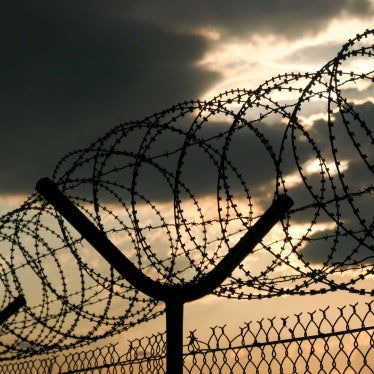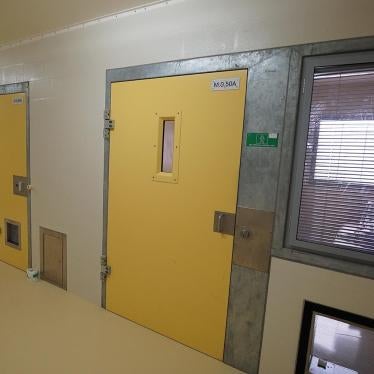Dear Attorney-General Michelle Rowland,
Congratulations on your appointment as Attorney-General. Human Rights Watch looks forward to engaging with you on critical human rights issues in relation to your portfolio.
Human Rights Watch is a nongovernmental human rights organization that is dedicated to defending and promoting human rights in about 100 countries around the world. We have had an office in Sydney since 2013. I am writing on behalf of Human Rights Watch in relation to the Albanese government’s position on raising the minimum age of criminal responsibility.
Labor Party’s Policy Position Backsliding
During the federal election, Human Rights Watch wrote to the major political parties to seek their positions on key human rights issues. This included their positions on raising the age of criminal responsibility. As you are aware, the age of criminal responsibility in most jurisdictions (including federal) in Australia is 10 years. The United Nations Committee on the Rights of the Child has recommended that the minimum age of responsibility be 14 years.
In its response to Human Rights Watch’s letter on April 21, 2025, the Australian Labor Party (ALP) wrote:
“Australian state and territory governments have primary responsibility for child protection, justice and detention. Overwhelmingly, age of criminal responsibility reform is a matter for state and territory governments. The Albanese Government remains committed to reform that will enable communities to establish locally tailored initiatives that address the underlying causes of incarceration, including to reduce the contact of First Nations children with the justice system. This includes the establishment of our landmark National Justice Reinvestment Program.”
Contending that age of criminal responsibility reform is “overwhelmingly” a matter for the states and territories is a significant departure from the ALP’s National Platform (chapter 6, point 37), which states that the party “will work closely with state and territory governments to review the age of criminal responsibility, paying regard to current international standards.”
It is also a step backward from the ALP’s 2022 election position, which stated that Labor believed the age of criminal responsibility was “too young” and would work closely with the states and territories to ensure it reflects what is best for children.
Current Understanding of the Issue
The treatment of children in Australia’s criminal legal system is one of Australia’s most pressing human rights concerns. We believe raising the age to at least 14 years, as recommended by international standards, should be a top priority for both the federal and state and territory governments.
There is a medical consensus that children under the age of 14 are still undergoing critical brain development, particularly in the frontal cortex, the area responsible for reasoning, impulse control, and decision-making. This development affects their maturity and capacity for abstract reasoning, making them more likely to engage in risky behaviors and less likely to comprehend the consequences of their actions or navigate criminal proceedings effectively. Setting the age of criminal responsibility at 14 does not, however, preclude the government from making non-criminal, child-friendly, and multi-disciplinary interventions in response to unlawful behavior.
International Response
At Australia’s Universal Periodic Review at the UN in 2021, 31 countries called upon Australia to raise the age of criminal responsibility to at least 14. The UN Committee on the Rights of the Child, the independent expert body that monitors state compliance with the Convention on the Rights of the Child, has recommended for 20 years that Australia raise the minimum age of criminal responsibility to an “internationally acceptable level.”
Domestic Response
In 2024, Australia’s National Children’s Commissioner Anne Hollonds, published a report ‘Help Way Earlier’, calling for a national reform of the youth legal system. The report noted that a barrier to reform is that the rights of children are not a national priority, and children are not respected or taken seriously as rightsholders.
The report made 24 recommendations, including that Australian governments raise the age of criminal responsibility in all jurisdictions to 14 years, and establish a National Taskforce for child legal system reform. It said the federal government should incorporate the Convention on the Rights of the Child into Australian law through a National Children’s Act and a federal Human Rights Act.
First Nations Children
First Nations children are grossly overrepresented in the criminal legal system, making up more than 60 percent of children incarcerated, despite First Nations children only representing about 6 percent of the total child population.
Under the Closing the Gap agreement, the federal government aims to reduce the rate of Aboriginal and Torres Strait Islander young people in detention by at least 30 percent by 2031 (target 11). A significant contributing factor to this overrepresentation is that more than one-third of First Nations children in detention are under the age of 14 when they are detained for the first time. Therefore, raising the age of criminal responsibility is crucial to meeting this target.
Human Rights Watch’s Recommendations
In 2024, Prime Minister Anthony Albanese announced the establishment of the first National Commissioner for Aboriginal and Torres Strait Islander Children and Young People. This action, which had long been advocated for by First Nations organizations, is an important contribution to the protection of First Nations children. The government’s Safe and Supported: The National Framework for Protecting Australia’s Children plan is also important policy work to protect children’s rights.
However, when children as young as 10 are incarcerated in prisons and locked in cells for up to 23 hours a day, Australia is failing to meet its international obligations to protect children’s rights. The long-term harms of incarceration to children’s mental and physical development are well known, and in the most serious examples, incarceration can be deadly for children. Evidence also shows that criminalizing children does not increase community safety.
While it is rare for children to be detained under federal law, if the government were to raise the federal age of criminal responsibility to at least 14 years, it would send a powerful message to the states and territories. The government should also work with the state and territories directly to raise the age of criminal responsibility in all jurisdictions.
Human Rights Watch urges the federal government to:
- Amend the Crimes Act 1914 and the Criminal Code Act 1995 to increase the minimum age of criminal responsibility for Commonwealth offenses from 10 years of age to at least 14 years of age.
- Work with state and territory governments to raise the age of criminal responsibility to at least 14 years of age in all jurisdictions.
- Implement the recommendations of the National Children’s Commissioner report ‘Help Way Earlier’.
- Ratify the Optional Protocol to the Convention on the Rights of the Child on a communications procedure, which establishes an international complaints mechanism for children or their representatives to submit complaints about violations of their rights.
- Withdraw Australia’s reservation to article 37(c) of the Convention on the Rights of the Child.
- Legislate a National Children’s Act and a federal Human Rights Act to implement the Convention on the Rights of the Child into Australia’s domestic law.
Human Rights Watch looks forward to working with you on this important matter and would welcome the opportunity to meet with you, or your staff, to discuss this further.
We thank you for your consideration of this letter.
Yours sincerely,
Annabel Hennessy
Australia researcher







